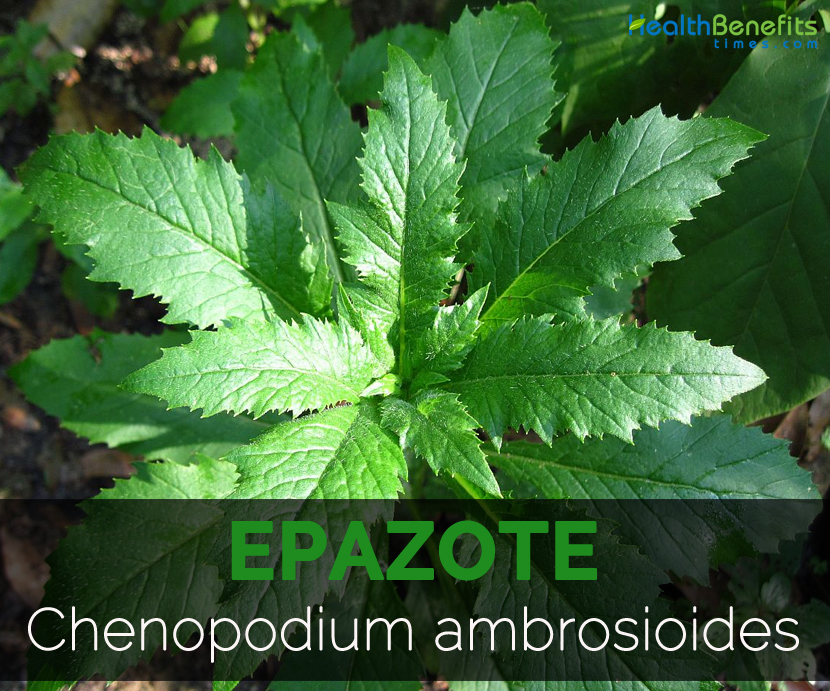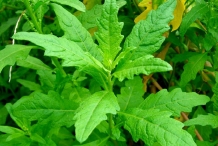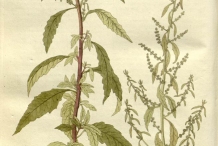| Epazote Quick Facts |
| Name: |
Epazote |
| Scientific Name: |
Chenopodium ambrosioides |
| Origin |
Native to South America, Central America and Southern Mexico. Today it has been cultivated and naturalized worldwide. |
| Colors |
Green (Leaves) |
| Shapes |
Simple, alternate, oblong-lanceolate; Length: 2 - 12 cm; Width: 2.5-9 cm (Leaves) |
| Taste |
Pungent, bitter |
| Calories |
0 Kcal./cup |
| Major nutrients |
Manganese (1.09%)
Vitamin B9 (0.50%)
Iron (0.25%)
Magnesium (0.24%)
Vitamin B2 (0.23%)
|
| Health benefits |
Gastrointestinal health, Lose weight, Treatment of worms, Effective metabolism, Enhance immune system |
| More facts about Epazote |
Epazote (scientific name Chenopodium ambrosioides) is an annual or perennial herb, 1 meter tall with simple, alternate, oblong-lanceolate leaves 2-12 cm long and 2.5-9 cm wide. The flowers are small, green and elongated. The stems are branched, terete-angular, hairless and reddish in color. The green or brown fruit yield horizontal or vertical, lenticular-subglobose, black, brown or reddish brown and shiny seeds. The plant does well in tropical and subtropical climates and thrives in well-drained soil. The flowering season occurs from July to August and the fruiting season is September.
The mostly common names for this species are Mexican tea, Wormseed, Chenopode, Apasote, Semen contra, American wormseed, Pazote, Simon contegras, Paico, Herbe a vers, Mexican tea, Mastruco, Paiku, Cashua, Payco, Anserina, Jerusalem tea, Wurmsamen, Mastruz, Camatai and Ambroisie du mexique.
History
Epazote is inherent to South America, Central America and Southern Mexico. Today it has been cultivated and naturalized worldwide. Throughout Mesoamerica, it has been used for centuries to eliminate the parasitic worms present in the body. It is believed to possess antiasthmatic, analgesic, vermifuge and stomachic. The plant is soaked in the boiling water and consumed as infusion. The oil is used as a poultice to treat insect bites and athlete’s foot.
Previously, Epazote as classified scientifically in the genus Chenopodium with 150 species which are called Goosefoots. Epazote is again reclassified in the genus Dysphania.
Nutritional Value
Epazote is loaded with nutritional punch and offers Vitamin C, Vitamin B, Vitamin A. Each 0.8 grams contains 0.025 mg of manganese, 2 µg of folate, 0.02 mg of iron, 1 mg of magnesium, 5 mg of potassium and 0.01 mg of zinc.
Health Benefits of Epazote
Epazote is added as an ingredient in preparing traditional Mexican dishes such as tamales, enchilada, black beans, salsa and mole. It is the vital ingredient for pinto bean recipes. It is used to treat malaria, respiratory infection, asthma and cholera. Besides its strong flavor, it provides various beneficial properties. It also effectively eliminates the harmful organisms from the body.
- Gastrointestinal health
Epazote possess the meaningful amount of fiber which helps to enhance the digestive process and promotes the bowel movements. It enhances the gastrointestinal system efficiency, lowers constipation, bloating, cramping and other serious ailments. Traditionally, Epazote removes the flatulence and indigestion. (1)
- Lose weight
100 grams of Epazote provides only 32 calories. This plant is loaded with enormous organic compounds and nutrients that are required for the body. The one who are trying to lose some weight should include Epazote which helps to keep full for longer period of time.
- Treatment of worms
Traditionally, Epazote was used to treat various types of worms in the body. Roundworms and Hookworms are defeated with the active ingredients found in Epazote. It is an effective choice for those people where basic sanitary conditions and water filtration are not available.
- Effective metabolism
Vitamin B complex is a vital element to maintain overall health. As their roles in maintaining human health may differ, it is related with efficiency and strength of metabolism. Epazote provides a meaningful amount of Vitamin B notably folic acid. Epazote provides about 50% of folic acid of daily recommended value which is necessary for the growth and development.
- Enhance immune system
Epazote contains an adequate amount of Vitamin A, antioxidant compounds and other carotenes which are required for the immune system. An antioxidant properties prevents the damage of free radicals and also eliminates it as it is the main cause for various cancer types and chronic disease. (2)
- Healthy bones
Epazote contains various amounts of minerals which help to prevent the bone ailments caused due to age. The adequate amount of phosphorus, copper, calcium, zinc and manganese helps to maintain the mineral density and prevent osteoporosis which means that the bones will be healthy and strong in later years.
- Heart ailments
Potassium acts as vasodilator which helps to relax the blood vessels and lower the strain on the cardiovascular system which helps to reduce the chances of atherosclerosis and prevent the chances of strokes and heart attacks. (3)
Comments
comments





